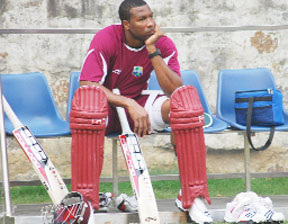By Tony Cozier
At the ICC World Cup
In DELHI
No cricketer’s life has changed more dramatically than Kieron Pollard’s since he first appeared in West Indies colours in one match in the 2007 World Cup in the Caribbean.
Yet, as he enters his second World Cup here today, the hulking Trinidadian won’t be satisfied until he can prove his worth on the international stage, as he has done so spectacularly at a more narrow, if appreciably more lucrative, level in Twenty20 cricket, the game’s newest and shortest incarnation.
While many of his performances for the several teams which have paid large sums for his rare ability to strike a cricket ball further and more often
than most are already legendary, Pollard aspires to a more meaningful legacy.
Like every cricketer, he is aware that, for all his mind-blowing Twenty20 contracts, he will be ultimately judged on his record at all levels.
A dominant role in the West Indies campaign over the next few weeks would be the perfect way for him to start establishing himself beyond the 20-overs-a-side limitations.
He carries an unflattering international record into the tournament. He averages 18.82 with just one score over 50 in 32 ODIs, 12.66 in 20 T20Internationals with 38 his highest.
If such statistics don’t lie, they don’t tell the truth, the whole truth and nothing but the truth. Pollard is better, far better, than they imply.
His overall first-class record is a more reliable guide. An average of 37.66 from 20 matches with three hundreds is better than many of those who have gained the West Indies Test spot that still eludes him. No one makes 179, his highest first-class score, purely by clouting sixes. Several factors combine to suggest that he can be critical to his team’s campaign in the coming weeks.
His belligerent batting (his ODI strike rate is 93.49 runs per 100 balls) on the slow pitches expected can instantly boost the course of an innings, whatever its state. His bowling in an inadequate attack is of the medium-pace type suited to such conditions and he is a surprisingly agile fielder for a massive, six foot-5 inch man.
In significant addition, he has plenty of experience of India, initially in Trinidad and Tobago’s advance to the final of the Champions League in 2008 and subsequently for the Mumbai Indians in the Indian Premier League (IPL). Chris Gayle is the only one in the West Indies team here who can match his profile with Indian fans.
Come the April 2 final – or whenever the West Indies play their final match – we will know whether Pollard remains a one-dimensional Twenty20 bully or whether he fulfils his potential to be much more. It is Twenty20, of course, that has utterly transformed his career.
From seeming flash-in-the-pan vopper, whose speculative selection four years ago was based on his six-hitting in the regional Stanford series and in his debut first-class season for Trinidad and Tobago, he has become one of the wealthiest, most recognisable and sought-after of contemporary players.
Like many of his teammates, he collected more from Allen Stanford’s various, now infamous cricketing ventures than most of his countrymen would earn in a lifetime – a share of Trinidad and Tobago’s US$1.5 million for their success in the two regional tournaments plus US$1 million for himself as part of the victorious so-called Stanford Supertstars in the 20/20 for 20 million match against England in Antigua in November, 2008.
All that has been dwarfed by the sums he has subsequently earned from the rapid global spread of Twenty20 tournaments. He remains the only player to represent four different Twenty20 teams in four different countries.
His breathtaking six-hitting that helped carry Trinidad and Tobago to the final of the 2009 Champions League final, most notably 54 not out off 18 balls against New South Wales, immediately attracted wider attention.
Since then he has starred for the South Australia Redbacks in Australia’s Big Bash, for Somerset in the English equivalent and, most lucrative of all, for the Mumbai Indians in the Indian Premier League (IPL) who paid out a reported US$2.5 million last month to outbid three in the players’ auction for the coming season.
At 23, he is a very wealthy man – but wealth is not measured by money alone.
Sometimes self-satisfaction is more important and that is what Pollard seeks now in cricket’s most prestigious tournament.

